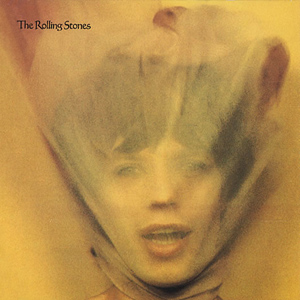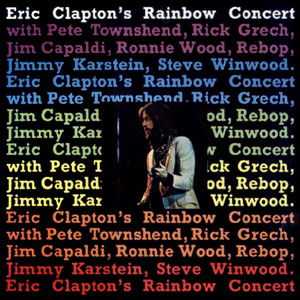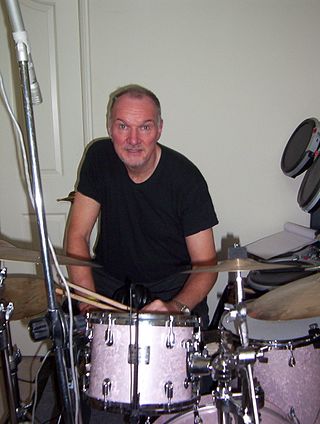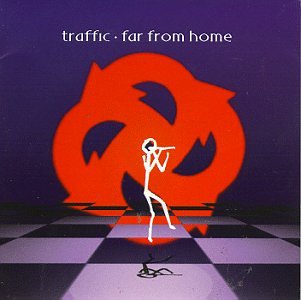
Blind Faith were an English supergroup featuring Steve Winwood, Eric Clapton, Ginger Baker, and Ric Grech. They were eagerly anticipated by the music press following on the success of each of the member's former bands, including Clapton and Baker's former group Cream and Winwood's former group Traffic, but they split after a few months, producing only one album and a three-month long summer tour.

Stephen Lawrence Winwood is an English musician, singer and songwriter whose genres include blue-eyed soul, rhythm and blues, blues rock and pop rock. Though primarily a guitarist, keyboard player and vocalist prominent for his distinctive, soulful high tenor voice, Winwood plays other instruments proficiently, including drums, mandolin, bass and saxophone.

Nicola James Capaldi was an English singer-songwriter and drummer. His musical career spanned more than four decades. He co-founded the progressive rock band Traffic in 1967 with Steve Winwood with whom he co-wrote the majority of the band's material. He was inducted into the Rock and Roll Hall of Fame as a part of Traffic's original lineup.

Alvin Lee was an English singer, songwriter, and guitarist. He is best known as the lead vocalist and lead guitarist of the blues rock band Ten Years After.

Goats Head Soup is the 11th British and 13th American studio album by the English rock band the Rolling Stones. It was released on 31 August 1973 by Rolling Stones Records. Like its predecessor Exile on Main St., the band composed and recorded much of it outside of the United Kingdom due to their status as tax exiles. Goats Head Soup was recorded in Jamaica, the United States and the United Kingdom. The album contains 10 tracks, including the lead single "Angie" which went to number one as a single in the US and the top five in the UK.

Dark Horse is the fifth studio album by English rock musician George Harrison. It was released on Apple Records in December 1974 as the follow-up to Living in the Material World. Although keenly anticipated on release, Dark Horse is associated with the controversial North American tour that Harrison staged with Indian classical musician Ravi Shankar in November and December that year. This was the first US tour by a member of the Beatles since 1966, and the public's nostalgia for the band, together with Harrison contracting laryngitis during rehearsals and choosing to feature Shankar so heavily in the programme, resulted in scathing concert reviews from some influential music critics.

Gary Malcolm Wright is an American musician and composer best known for his 1976 hit songs "Dream Weaver" and "Love Is Alive", and for his role in helping establish the synthesizer as a leading instrument in rock and pop music. Wright's breakthrough album, The Dream Weaver (1975), came after he had spent seven years in London as, alternately, a member of the British blues rock band Spooky Tooth and a solo artist on A&M Records. While in England, he played keyboards on former Beatle George Harrison's triple album All Things Must Pass (1970), so beginning a friendship that inspired the Indian religious themes and spirituality inherent in Wright's subsequent songwriting. His work since the late 1980s has embraced world music and the new age genre, although none of his post-1976 releases have matched the same level of popularity as The Dream Weaver.
Mylon R. LeFevre is an American Christian rock singer best known for his work with his band Mylon and Broken Heart. He is a member of the Gospel Music Hall of Fame. He travels around the United States, ministering, teaching and singing. He sometimes can be seen on television networks, such as TBN, Daystar and Victory Channel.

The discography of English singer-songwriter and former member of the Beatles, George Harrison consists of 12 studio albums, two live albums, four compilation albums, 35 singles, two video albums and four box sets. Harrison's first solo releases – the Wonderwall Music film soundtrack (1968) and Electronic Sound (1969) – were almost entirely instrumental works, issued during the last two years of the Beatles' career. Following the band's break-up in April 1970, Harrison continued to produce recordings by his fellow Apple Records acts, notably former bandmate Ringo Starr. He recorded and collaborated with a wide range of artists, including Shankar, Bob Dylan, Eric Clapton and Gary Wright.

When the Eagle Flies is the seventh studio album released by English rock band Traffic, in 1974. The album featured Jim Capaldi, Steve Winwood and Chris Wood, with Rosko Gee on bass guitar. Percussionist Rebop Kwaku Baah was fired prior to the album's completion, but two tracks feature his playing. Winwood plays a broader variety of keyboard instruments than most previous Traffic albums, adding Moog to their repertoire. This was the last Traffic album for 20 years, when Winwood and Capaldi reunited for Far from Home in 1994.

Eric Clapton's Rainbow Concert is a live album by Eric Clapton, recorded at the Rainbow Theatre in London on 13 January 1973 and released in September that year. The concerts, two on the same evening, were organised by Pete Townshend of the Who and marked a comeback by Clapton after two years of inactivity, broken only by his performance at the Concert for Bangladesh in August 1971. Along with Townshend, the musicians supporting Clapton include Steve Winwood, Ronnie Wood and Jim Capaldi. In the year following the two shows at the Rainbow, Clapton recovered from his heroin addiction and recorded 461 Ocean Boulevard (1974).

Ian Russell Wallace was an English rock and jazz drummer, most visibly as a member of progressive rock band King Crimson, as a member of David Lindley's El Rayo-X and as Don Henley's drummer.

Billy Preston is the eleventh studio album by American soul musician Billy Preston, released in 1976 on A&M Records. It includes the singles "I've Got the Spirit" and "Girl", both of which were top 50 hits on Billboard's Soul Singles chart in the US. Preston recorded the album in Malibu, California in March 1976, shortly before joining the Rolling Stones on their two-month European tour.
Lynn Arthur Nichols is an American songwriter, producer, and musician from New York who now resides in Nashville, Tennessee.

"Ding Dong, Ding Dong" is a song by English rock musician George Harrison, written as a New Year's Eve singalong and released in December 1974 on his album Dark Horse. It was the album's lead single in Britain and some other European countries, and the second single, after "Dark Horse", in North America. A large-scale production, the song incorporates aspects of Phil Spector's Wall of Sound technique, particularly his Christmas recordings from 1963. In addition, some Harrison biographers view "Ding Dong" as an attempt to emulate the success of two glam rock anthems from the 1973–74 holiday season: "Merry Xmas Everybody" by Slade, and Wizzard's "I Wish It Could Be Christmas Everyday". The song became only a minor hit in Britain and the United States, although it was a top-twenty hit elsewhere in the world.

Far from Home is the eighth and final studio album by the rock band Traffic. It was recorded at a large house called Woodstock, outside Kilcoole to the south of Dublin, and mixed at the Chateau Miraval in Correns, southern France. The project began as a revival of the writing collaboration between Steve Winwood and Jim Capaldi, but soon blossomed into the first Traffic project since 1974.
"So Sad" is a song by English rock musician George Harrison that was released on his 1974 album Dark Horse. Harrison originally recorded the song for his previous album, Living in the Material World, before giving it to Alvin Lee, the guitarist and singer with Ten Years After. Lee recorded it – as "So Sad " – with gospel singer Mylon LeFevre for their 1973 album On the Road to Freedom. The latter recording includes contributions from Harrison and marked the first of several collaborations between him and Lee.

"That's the Way God Planned It" is a song by American musician Billy Preston and the title track to his 1969 album of the same name. Issued as a single, the song was Preston's first release on the Beatles' Apple record label, following his guest role on the band's "Get Back" single. The lyrics to "That's the Way God Planned It" partly reflect the long musical apprenticeship Preston had served since childhood, mentored by artists such as Sam Cooke and Ray Charles, while musically the track combines the gospel tradition with rock. Produced by George Harrison in London, the recording also features contributions from Eric Clapton, Keith Richards, Ginger Baker and Doris Troy. Having been edited down to three minutes for its single release, the full version appeared on the album, as "That's the Way God Planned It ".

"All That I've Got " is a song by American soul musician Billy Preston that was released in January 1970 as his third single on Apple Records. It was written by Preston and his fellow Apple artist Doris Troy and produced by George Harrison. In the United States, the single missed the Billboard Hot 100 chart, peaking at number 108. According to Harrison, the song was Preston's musical response to criticism that he had abandoned his black soul roots by embracing rock music.
















